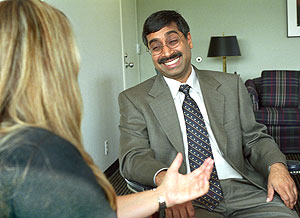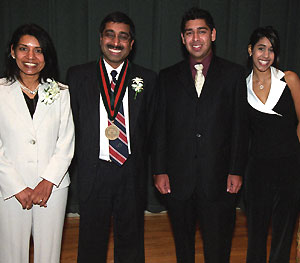It hasn’t taken long for Mahendra Gupta, Ph.D., to get acclimated to his new role at the Olin School of Business. One year into his term as dean, he is usually seen in a dapper suit and tie, a huge smile emerging from beneath his mustache as he greets people by name. All in all, he is the picture of professionalism.
Gupta’s success in academia is the result of following his intellectual curiosity.

Just as business requires making some unusual choices to get ahead, Gupta’s decision to leave India to pursue his academic degrees was unconventional at the time.
His father owned his own business, and Gupta was expected to work there. Instead, he felt compelled to study at a business school.
After earning an undergraduate degree at Bombay University, Gupta decided to pursue an M.B.A. at Carnegie Mellon University in Pittsburgh. The plan was to return to India and join the family business once he completed his degree.
Gupta described his experience pursuing his M.B.A. as life-altering. He had the opportunity to take some Ph.D.-level classes, which he enjoyed, but he believed he was not attracted to the academic life.
“When I graduated, many of my professors urged me to continue my studies and earn a Ph.D.,” says Gupta, now the Geraldine J. and Robert L. Virgil Professor of Accounting and Management. “I had taken several Ph.D. courses at Carnegie Mellon and had observed how hard the doctoral candidates worked. I couldn’t imagine that for myself.”
As planned, Gupta returned to India, where he spent the next five years working in the family business as well as a few other businesses. During that time, Gupta met and married his wife, Sunita, and they started their family.
But the seeds planted by his Carnegie Mellon professors began to grow, and Gupta found himself looking into doctoral opportunities in the United States. An offer from Stanford University turned the possibility of a Ph.D. into reality.
Although their parents hoped the move would be short-lived, it was apparent once they landed in California that the family was there to stay.
Gupta’s research has focused on managerial accounting. He has studied cost management, performance management and the evaluation of efficiencies in service-delivery processes. He says the five years he worked as a manager in India turned out to be a critical experience for his future academic and administrative careers.
“I learned a lot from the family business,” he says. “I learned how to manage organizations. I learned how to manage people. I learned the realities of complex business decisions.
“And I learned the importance of taking care of people within the organization to create the right culture for optimal performance.”
Gupta came to the Olin School of Business in 1990, having been recruited by Nick Dopuch, Ph.D., the Hubert C. and Dorothy R. Moog Professor of Accounting, and Robert L. Virgil, Ph.D., former dean and professor emeritus of accounting.
“Mahendra is one of the hires I’ve been most proud of,” Virgil says. “I remember meeting him when he interviewed at Olin. I was struck by his enthusiasm, his passion for his research and for teaching. All of that was borne out eventually.
“He has been involved in a number of things. We could count on him to shoulder the work and perform the service necessary to make Olin and Washington University a better place.”
Gupta’s track record proves Virgil’s point. As a junior faculty member in 1996-97, he was the Marcile and James Reid Professor, an award bestowed annually by senior faculty in recognition of outstanding teaching and research. Students have honored Gupta by voting for him to receive the Reid Teaching Award seven times since 2001.
“It’s an absolute bummer that he won’t be teaching anymore,” says Rick Holton, a 2004 M.B.A. graduate and president of the Selling Block. “For me, his cost-accounting class was one of the most valuable classes I took.

“He can do a lot more for the school as a whole than teaching that class — even though the new crop of students is going to miss the opportunity to experience his class.”
In 2003, Gupta increased his involvement in shaping the business school’s future by taking on the role of senior associate dean. When Stuart I. Greenbaum, Ph.D., the Bank of America Professor of Managerial Leadership, announced he was stepping down as dean in 2004, Gupta said it was a natural progression for him to consider the position.
“I wanted to contribute more to the success of our school and our students from a leadership role,” Gupta says when asked why he wanted to be dean. “The responsibility of senior associate dean gave me more opportunities to have an impact, and it gave me the experience and confidence to apply for this position.”
From the standpoint of the transition to a new dean, having Gupta in the position meant there wouldn’t be the usual lag time it takes for a new dean to adjust to a new environment and new position.
“We needed someone with enough common sense and experience to be able to work with the faculty and sort through any issues that needed addressing and not lose a lot of time in terms of being able to initiate change,” says Anjan Thakor, Ph.D., senior associate dean, the John E. Simon Professor of Finance and chair of the dean’s search committee.
“Our assessment of Mahendra is that he was sufficiently open-minded, and given his knowledge of the institution, he could sit down with faculty and all concerned stakeholders and figure out a strategy for change and for moving ahead.”
Gupta wasted no time in tackling some big issues.
Under his guidance, faculty, staff, alumni and students have completely redesigned the Executive M.B.A. program and introduced new courses into the M.B.A. program. Gupta has also set up a committee to examine how to improve the B.S.B.A. program.
Gupta recognizes that not everything in the school needed changing, but the best time to consider how to improve a product is when things are going relatively well, Gupta says. The way to begin the changes is to leverage the Olin School’s biggest strength — world-class research and teaching.
“The business school is uniquely positioned to be agile and responsive to the needs of students, recruiters and the business community and to offer customized programs and services,” Gupta says.
To that end, Gupta’s initiatives focus on the school’s new strategy: analytical rigor, creativity, innovation, global reach and experiential learning. The strategy is designed to imbue students with the ability to solve complex, unstructured business problems.
Gupta says the strategy addresses what many employers say is a gap in business students’ critical-thinking skills.
The strategy also embraces innovation and creativity, which will encourage cross-University partnerships and drive changes in program curricula. Gupta says a multidisciplinary course in innovation is already under construction for second-year M.B.A. students.
Involving many faculty members, the class is designed to foster students’ creative-thinking and problem-solving skills while teaching them how to transform novel ideas into business processes that will fuel competitive advantages.
Another example of the direction in which Gupta is leading the school was already embodied this spring in a new course taught by former Emerson chief executive officer Charles F. Knight and Thakor.
The class, “Creating Exceptional Value: Performance Without Compromise,” included several guest lecturers, including Jack Welch, former CEO of General Electric; Larry Bossidy, former CEO of Honeywell; Lou Gerstner, former CEO of IBM; August Busch III, chairman of Anheuser-Busch Cos.; and David Farr, chairman and CEO of Emerson.
“In an understated way, Mahendra has put in place a variety of strategic and tactical initiatives,” Thakor says. “He has also displayed a tremendous commitment to building the faculty as well as diversity initiatives, and this was evidenced by the effort put into faculty recruiting this year, and the fact that we have hired five new faculty, including two female faculty.
“Moreover, he has also reached out and built bridges with other schools in WashU, so that we are well-positioned for increased collaboration with them in the near future. This, coupled with all the other achievements for this year, means that he is off to a great start, and the prospect for building on this initial momentum is exciting.”
Gupta says no matter what he knows intellectually about running an organization, it is really due to the strong faculty and staff that he has had such a fruitful year.